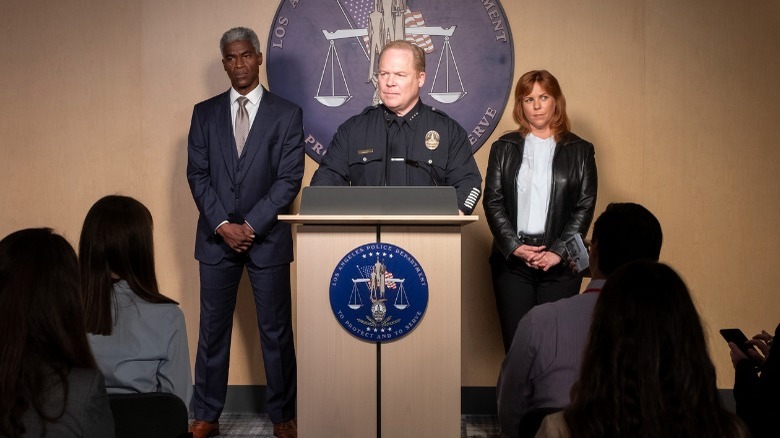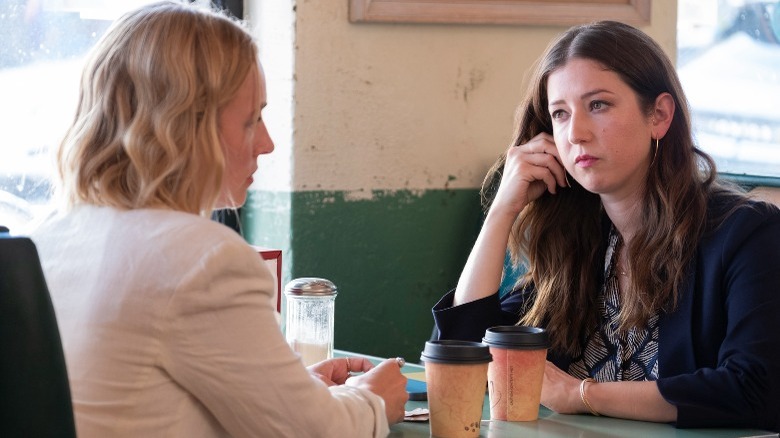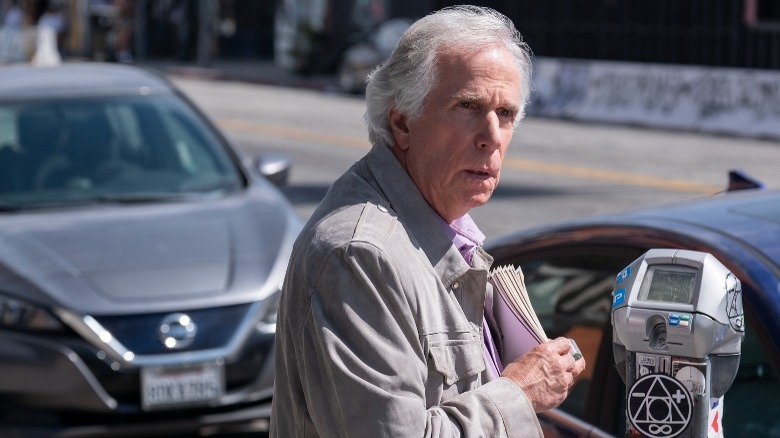Barry Season 4 Brings The Series (And Its Comedy) Back To Its Hollywood-Skewering Roots
This post contains spoilers for the two-episode season 4 premiere of "Barry."
When "Barry" ended last season, it was with all the pitch-black drama of a series like "Breaking Bad" or "The Wire." The season finale featured a brutal, lengthy scene that saw Sally (Sarah Goldberg) beat a man to death after he tried to choke her, and a few scenes later, Barry (Bill Hader) was arrested in an LAPD sting orchestrated by the man he looks to as a hero. With Barry headed behind bars and his double life as an actor and assassin no longer hanging in the balance, one had to ask: how will this show ever be funny again?
The answer, it turns out, is by letting its comedy evolve alongside its subject matter. In its early seasons, "Barry" mined comedy from the desperation of Hollywood, cracking jokes about no-talent dreamers and washed-up B-listers. As Barry and especially Sally began to see success, the show got even more incisive in its comedy, skewering nonsensical streaming algorithms and equally confounding industry expectations for women. Yet in the wake of the third season finale's traumatizing showdown and its aftermath, it's hard to imagine that Sally or Barry's careers will play much of a role in the show's final season.
'Barry' takes on true crime
So how does "Barry" keep its sense of humor once the stage lights go dark? Well, by pivoting to an industry that's all-too-relevant — true crime. The new season makes its interest in true crime, or at least in a clever takedown of America's collective obsession with it, clear from its very first scene. In it, a security guard at the prison where Barry's being held exclaims with inappropriate joy that the latest inmate is famous. "He was just on screen, and now he's in our cell block," the guard exclaims. "Dude, that's awesome!"
As one of the most expertly written, edited, and directed shows on TV, it's no mistake that this was the very first thing viewers saw this season. It's a moment that reads like a statement to viewers about our own relationship with the show. Barry has been a killer ever since the first episode of the series, and he's only gotten less sympathetic and more unforgivable with time. By now, it's clear that while he may be the show's protagonist, he's definitely not its hero, or even its antihero. If we root for Barry, we sound like this guy, and that's not a compliment.
This opening joke isn't just for "Barry" fans, though; it points to an entire culture that responds to stories about real-life murderers as if we're starstruck. From the still-pervasive Ted Bundy fanbase to podcasts that turn discussing violent crime into a ladies' night activity, there are plenty of real-life examples of large groups of people looking at a situation like Barry's and responding, "Awesome!"
'You have integrity ... I'm so sorry'
The ethics of true crime come up at least twice more over the course of the two-episode premiere. When Sally meets with her agent, Lindsay (Jessy Hodges) says she can no longer represent her — but that Sally can still have a lucrative career in another avenue. "If you wanted you could have a reality show or a podcast," Lindsay says, "and you would make more money than God." She looks sad, but not for Barry's victims or retraumatized Sally. Instead, she's mourning the career her client could have had. Sally has two strikes against her (an elevator meltdown and dating a serial killer are on par here, apparently), plus, as Lindsay puts it, "You have integrity ... I'm so sorry." She delivers the line like a fatal diagnosis: integrity, and it's terminal.
These moments aren't exactly capital J-Jokes so much as darkly funny reactions delivered within a bleak context. "Barry" does capitalize on its most recent twist of fate with some outright comedic bits as well, like when E! News reports that it turns out Sally, the "Entitled C-word," has a boyfriend who's "an entitled K-word: a killer." Plus, there's the hilariously ghoulish reaction of Gene Cousineau (Henry Winkler), Barry's acting teacher whose hunger for stardom knows no bounds.
Gene's one-man show is an on-brand abomination
After agreeing with Jim (Robert Wisdom) that it would be both disrespectful and unhelpful for the case for him to talk to the press, Gene performs a ridiculous one-man show for a Vanity Fair reporter. He acts out every moment of his relationship with Barry and frames himself as the hero along the way. The fact that Gene doesn't get that he won't really work as an anonymous source feels like an extension of the character we've known all along, blinded by even the smallest spotlight. The fact that he's decided to turn this horrendous thing that he never stopped to fully process into corny, fame-courting performance art also tracks.
"Barry" brings its sharp comedic edge to the topic of true crime not by outright condemning the subgenre, but by evolving its Hollywood satire in a way that feels both natural and darkly hilarious. Of course these people would sell the story of the worst parts of their lives to the highest bidder. Of course the tabloid cycle would make Barry's arrest look like a hot gossip item rather than a horrific situation. The final season of "Barry" doesn't just keep up the dark humor that makes the series great, it lets it plunge to the same moral depths at the drama storyline, and the result is — for the first time in a while for this show — more funny than it is depressing.
"Barry" airs on HBO and HBO Max on Sundays at 10 p.m. ET.



